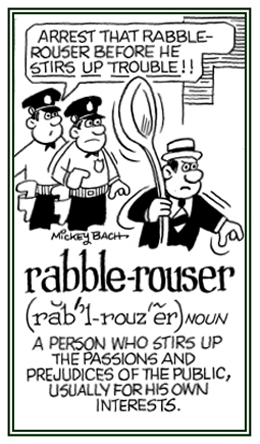2. An iron bar, usually with a bent end, used to skim, to stir, or to puddle melted iron: At the smelter, the worker using the rabble to rake the liquified metallic element requires extensive training.
2. Worn or broken stones, etc. that are used as filling in the construction of walls: The stone mason saved the rubble from his work to be used later when the wall was built.
3. Unfinished stone from a quarry: The sculptor used the rough piece of rubble from the quarry to carve a beautiful statue.
At the construction site, the worker used a rubber handled rabble to break up the cement into rubble which was considered rubbish. The worker was paid with a currency of rubles which were transferred directly into his bank account.
Sometimes, the term rabble is used as an insulting term for "common people".
2. A passionate speaker or orator who capitalizes on the emotions and prejudices of a group of people: Trina, the president of the student body, was considered a rabble-rouser by the administration who feared she would incite student marches.
A master at making rabble-rousing an art form
Michael Moore was considered to be an abrasive filmmaker who staged a frontal assault on the free-enterprise system in one of his films.
Moore's recent film entry this year is "not a sortie against a particular industry. It is a frontal assault on the very idea of American free enterprise; a beast," he called it in a rabble-rousing speech to an audience in Toronto, Canada.
Moore has come out with a film that concludes that capitalism is evil. American liberals have classified him as an "egomaniac, glutton, exploiter, embarrassment, and slob". The derogatory terms applicable to Moore by others was not mentioned.
In the last few years, his personal mood is said to have wavered between what he called "passive despair and outright anger".

